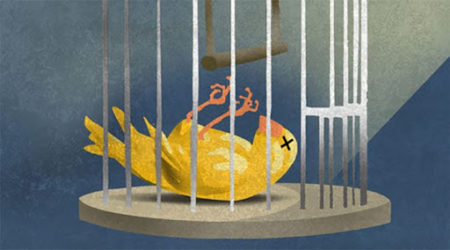Missouri as canary, chocolate for weight loss, this is your brain on Covid, and more
25 Jun 2021
Posted by Andrew Kantor
Eat a bar of chocolate in the morning and good things will happen the rest of the day
Post-menopausal women who eat 100g of chocolate in the morning (that’s 3.5oz in Freedom Units) can actually lose weight, at least according to researchers out of Brigham and Women’s Hospital.
Apparently eating what they call “a concentrated amount of chocolate” (and what I would call “two medium bites”) first thing in the morning (the time is important) more than made up for the snack itself, cutting calories overall and even helping maintain healthy blood sugar.
“Our volunteers did not gain weight despite increasing caloric intake. Our results show that chocolate reduced ad libitum energy intake, consistent with the observed reduction in hunger, appetite and the desire for sweets shown in previous studies.”
And it isn’t even the good stuff — the study used milk chocolate!
Not with a bang, but with an expiration
Governor Kemp signed the state’s final public health emergency order for the Covid-19 pandemic. It will expire on June 30 at 11:59:59 pm*, and with it any remaining restrictions in the state related to the outbreak.
* Technically “midnight on July 1,” but we know that can be confusing.
Elsewhere: “Show Us State” edition
Thank you, Missouri, for having so many unvaccinated people that you are not only “becoming a cautionary tale for the rest of the country,” but will act as the warning signal for the rest of us as variants spread.
“If people elsewhere in the country are looking to us and saying, ‘No thanks’ and they are getting vaccinated, that is good,” said Erik Frederick, chief administrative officer at Mercy Hospital Springfield, which has been inundated with COVID-19 patients as the variant first identified in India rips through the largely non-immunized community. “We will be the canary.”

Like this, but Missouri-shaped
Unanswered questions
Will we need a booster?
So far, the consensus is “probably,” but also “it depends.” At issue is how long cases continue to spread thanks to unvaccinated people, because no one know how long the vaccines will last, so … well, see “Elsewhere” above for how we’ll know.
At the moment, though, there’s no recommendation for boosters coming from the Powers That Be.
What did Chinese researchers know and when did they know it?
Much finger-pointing over the idea that some information about the SARS-CoV-2 virus — gene sequences — were apparently removed from Google Cloud files being shared by researchers.
While there might be good reasons to (re)move information like that, it does feel a little suspicious.
On the other hand, when you look past the uproar, you learn that “the Chinese scientists later published the viral information in a different form, and the recovered sequences add little to what’s known about SARS-CoV-2’s origins.”
On the gripping hand, there wouldn’t be this kind of uproar if everyone had just been transparent in the first place, amiright?
And, related:
Did it jump naturally from bats (?) to humans, or was it being researched at the Wuhan Institute of Virology and leaked because of an accident? (It is clearly a natural virus, not man-made.) Eventually we’ll probably know — just not today.
More of less
With more than 600,000 American victims, the Covid-19 pandemic reduced U.S. life expectancy to its lowest level since 1943, according to new research. (Apparently there was some kind of war going on at that time.)
Remember, “life expectancy” is an average — it means Covid killed enough people at a younger age to throw off the population’s bell curve, not necessarily that individuals live shorter lives*.
That said, the U.S. still has the lowest life expectancy among Western nations, and here is also where Covid had the biggest impact on that figure.
* Fun fact: People in the Middle Ages weren’t old at 40; they often lived into their 70s and 80s. But infant mortality was so high that it pulled down the average.
Better bad taste than no taste
Survivors of some head and neck cancers may find their tongues are less sensitive. It’s seems to be a combination of having taste buds damaged by either radiation of chemotherapy, as well as that radiation therapy damaging the chorda tympani facial nerve — it connects the tip of the tongue to the brain.
The bad news is that this “taste dysfunction” can last for years. The sort-of-good news is that taste buds typically regenerated in a week or two, so that damage is undone. And while the nerve damage is probably permanent, it only affects the nerves at the tip; cancer survivors did just as well as the control group on the “whole mouth” test.
Something to think about … while you still can
I’m not sure you need another reason not to get Covid-19, but just in case … how about “loss of gray matter and other brain tissue”?
The long-term experiment, which involved 782 volunteers, compared brain scans of individuals before the pandemic. […] Among those participants who recovered from COVID-19, researchers saw significant effects of the virus on human cerebral matter, with a loss of gray matter in regions of the brain.
Comfort yourself with the fact that the Oxford University study hasn’t been peer reviewed yet.
Saving you a click
The headline: “The mRNA Vaccines Are Extraordinary, but Novavax Is Even Better”
The logic: Novavax is cheaper to make, and because it’s based on older (i.e., non-mRNA) technology, might be more acceptable to the people who believe the Pfizer or Moderna vaccines will alter their DNA and turn them into newts.


